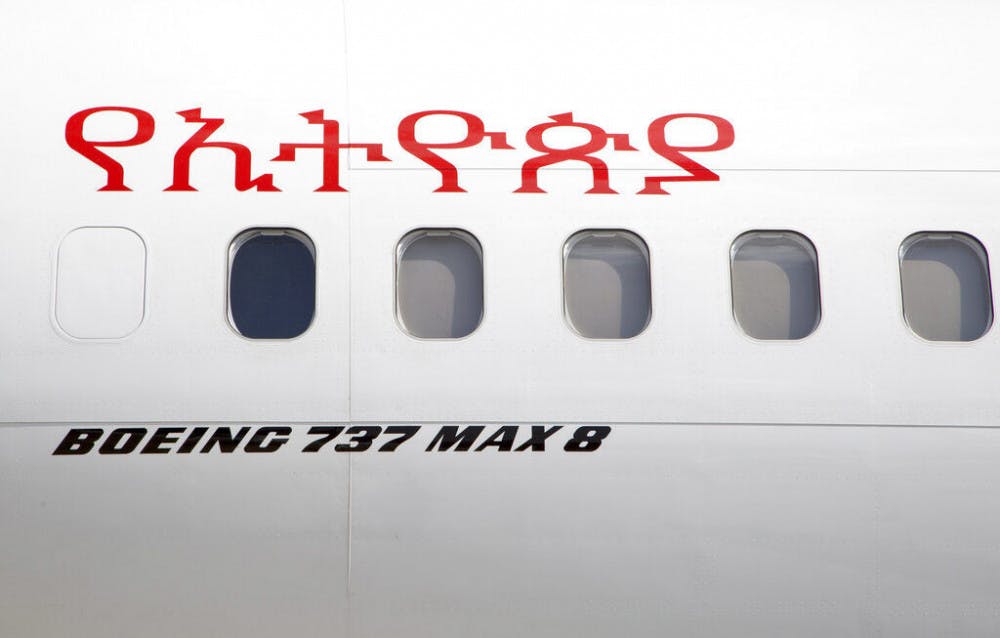A crash that happened halfway around the world should be a warning sign to passengers everywhere.
On March 10, minutes after takeoff, a Boeing 737 MAX jet operated by Ethiopian Airlines crashed near Bishoftu, Ethiopia. One hundred and eighty-nine people were killed, and the crash was soon followed by an investigation, with almost all 737 MAX jets grounded during the investigation. Throughout this time, we learned some concerning facts, such as the similarities between this crash and another crash involving a Boeing 737 MAX in October, raising questions about the safety of that plane model. However, what should be even more concerning to the public is that Boeing knew of these problems, and how these problems escaped the notice of regulators at the U.S. Federal Aviation Administration (FAA).
According to Quartz, the primary problem lay with a software system called MCAS, which automatically pitched the plane downward. While this was intended to prevent stalling, the mechanical sensor MCAS depended on failed, leading to the fatal crash. While there were features available to avoid a dangerous situation like this, a New York Times article showed how Boeing listed these important safety features as optional, charging extra to airlines that wanted them. Many low-cost airlines like Lion Air (the airline involved in the October 2018 crash) opted not to get them.
In addition, a Vox article showed how the FAA in recent years has abdicated its regulatory role over Boeing, as budget cuts and an overall cozy relationship with the airplane manufacturer led to the agency delegating more and more of its certification work to Boeing itself. In light of this, it may come as no surprise that a Seattle Times investigation found that Boeing was aware of the MCAS issues with the 737 MAX but downplayed them to officials at the FAA, who did not prod further. In essence, Boeing was able to largely regulate itself, with few checks from the government agency whose job it is to regulate air traffic. Furthermore, in an attempt to cut costs on training, Boeing claimed prior to the crash that pilots didn’t need much training to transition to the Boeing 737 MAX, and some airlines only required a 1- to 3- hour long self-administered course as enough training for the plane. Boeing said the 737 MAX was similar enough to previous models which meant further training wouldn’t be required, but the power of the MCAS system and its software issues calls that assertion into question.
So, what can we take away from this? A systemic problem escaped the notice of U.S. regulators, which should be a sign that regulators need to keep a closer eye on airplane manufacturers like Boeing. The relationship between manufacturers and regulators may be getting too cozy. A thorough job of inspecting aircrafts for compliance should be performed instead of trusting the companies to regulate themselves. The FAA should no longer take a lenient stance toward the commercial aviation industry, they need to retake complete control of the certification process and mandate increased pilot training for new planes and they must end the self-regulation of favored companies like Boeing. Such a move likely wouldn’t be appealing to Congress, given that Boeing is America's single largest exporter and contributes a lot to the U.S. economy. J.P. Morgan even predicted a negative impact on GDP if production on the Boeing 737 MAX is halted. In addition, Boeing has donated over $4.5 million to candidates in the 2018 elections and spent over $15 million on lobbying, making Boeing a major player in politics. Still, for the sake of air travel passengers everywhere, someone needs to keep Boeing accountable and ensure all of their products are as safe and that the pilots using them are well-trained in the mechanics of the aircraft they are flying. Lives depend on it.
Jason Zappulla is a UF history junior. His column appears on Mondays.
An Ethiopian Airlines Boeing 737 Max 8 sits grounded at Bole International Airport in Addis Ababa, Ethiopia Saturday, March 23, 2019. The chief of Ethiopian Airlines says the warning and training requirements set for the now-grounded 737 Max aircraft may not have been enough following the Ethiopian Airlines plane crash that killed 157 people. Writing in Amharic reads "Ethiopian". (AP Photo/Mulugeta Ayene)






